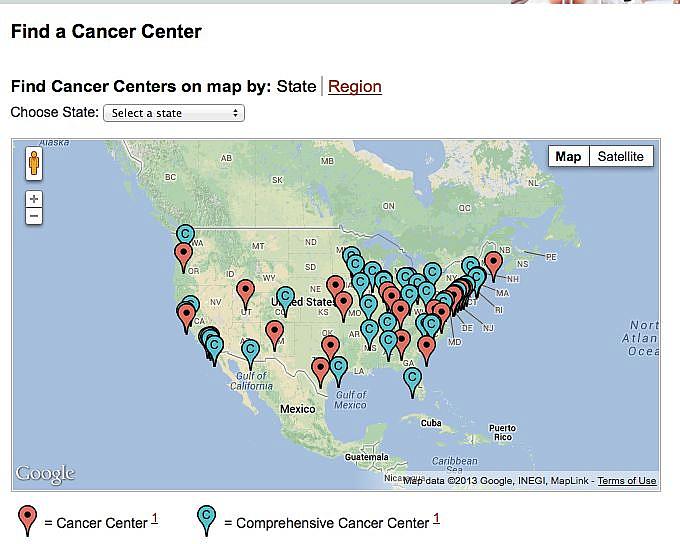Finding the best hospitals to treat your cancer

Image courtesy of www.cancer.gov
I was diagnosed with stage 4 lung cancer earlier this year and have been in treatment since. I felt a thrill in July when my hometown doctor in Illinois told me that my cancer was in remission. But the thrill was gone just a few weeks later when I was told by my main doctor at Houston’s MD Anderson that I had a second tumor on my rib that needed treatment with radiation.
When it comes to managing my own health care, I have the advantage of more than a decade of reporting on health and input from veteran colleagues who can help point me to the right information for making decisions. The unfortunate turn of events with my missed tumor made me think how important it is for patients without the same resources to know where to research their own options.
I spoke to the American Cancer Society’s (ACS) Deputy Chief Medical Officer, Dr. Leonard Lichtenfeld, to seek his views about when relying on local medical care makes sense and when people should consider traveling to a big-name medical center given the hassle and expense.
“Not everyone wants to travel to get treated. Many people don’t,” he said. He also acknowledges that it’s tough to find an accurate list of the top centers for specific cancers. A lot of information on the Web is unreliable.
ACS does not recommend specific hospitals or centers.
Common cancers can be effectively treated in community hospitals, he said, assuming the facilities follow certain guidelines: they should handle a sufficient volume of similar cases, they should use a team-based approach to treatment, and they should be attuned to recognized treatments for specific cancers. Breast and colon cancers are examples of diseases that can be treated locally, he said.
“When you start getting into complicated head, neck, esophageal, and pancreatic cancers, you want to go the the major centers that see a lot of those (cases),” Lichtenfeld said. “Sometimes it comes down to getting that second opinion.”
The list also includes rare cancers, ovarian and some other gynecological cancers, as well as myeloma.
Patients can start by checking to see if a hospital has a designation from the National Cancer Institutes (NCI), a part of the National Institutes of Health. Both are part of the Department of Health and Human Services, Lichtenfeld said. NCI-designated centers are dedicated to research and often develop more effective approaches to prevent and diagnose cancer, according to the agency’s website. Most of the 68 centers are affiliated with university medical centers; freestanding centers engage only in cancer research.
Click here to find a center by state or region.
Lichtenfeld also relies on the National Comprehensive Cancer Network (NCCN), a not-for-profit alliance of 23 of the world’s leading cancer centers, for guidelines of various treatments: www.nccn.org.
If you have a local oncologist, it might be worth getting their input, he said.
Some health insurers designate hospitals that have valued experience with certain cancers as “Centers of Excellence” and will cover patients’ expenses there, said Lichtenfeld. He notes the potential conflict of interest since the insurers sometimes have contracts with these centers.
“What concerns me — what keeps me awake at night — is that there are a lot of financial incentives to keep people in place with their own (oncology) group,” he said.
As our payment model for health care evolves, some of the newly formed organizations, such as Accountable Care Organizations, may prefer to keep patients within their own system, even though more appropriate specialized care may be available elsewhere, he said.
In my next post, I’ll tell you about some resources worth exploring if you decide to travel for treatment.
This article has been reposted with permission from the Thompson Reuters blog "Cancer in Context."

